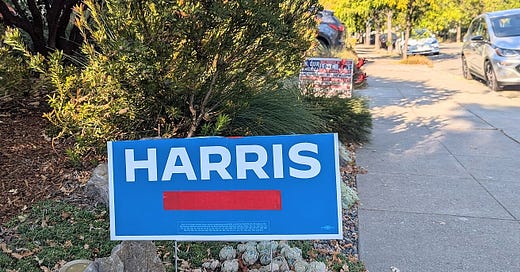While I was on vacation, someone tried to kill Donald Trump, the Supreme Court ruled that presidents have immunity for “official acts,” Joe Biden withdrew his candidacy, Kamala Harris became the likely Democratic nominee, and I got COVID after successfully avoiding it for four years. Biden had looked like he was heading for defeat, but Harris’ candidacy has reset the presidential race. She now appears to be the favorite to win in November.
When I wrote about the US presidential election in February, Donald Trump had a modest, statistically insignificant lead over Joe Biden in early head-to-head polling. I believed at the time Biden’s numbers would improve as Americans started paying closer attention to the race and taking the prospect of a second Trump term more seriously. I didn’t realize then how serious Biden’s age-related deficits were becoming or how much they would hurt him with voters. Biden’s numbers didn’t improve.
Biden’s disastrous debate performance on June 27 seemed to confirm voters’ worries about his ability to continue to do the job of president. On July 1, the Supreme Court ruled 6-3 in Trump v. United States that presidents presumptively have immunity from criminal prosecution for “official acts,” which called into question the viability of the otherwise serious legal cases against Trump. Then, on July 13, Trump narrowly survived an assassination attempt when a 20-year old man—a registered Republican apparently looking for a convenient public figure to kill—shot Trump at a campaign rally in Pennsylvania. Trump went into the Republican convention the next week triumphant, seeming like the candidate of destiny. Even Biden’s supporters were skeptical he was capable of winning.
But the dynamics of the race changed on July 27 when Biden ended his candidacy in response to pressure from a range of other Democratic leaders and endorsed Vice President Kamala Harris to be the party’s nominee. Harris was essentially a Schelling point. As Thomas Schelling pointed out, there are some situations—game theorists call them “coordination games”—in which it’s more important that people follow a common plan of action than that they follow a particular plan of action. In coordination games, it makes sense for people to adopt what seems like the most obvious satisfactory course of action—the Schelling point—rather than the one that seems best to them personally.1 In this case, it made sense for Democrats to rally around Biden’s obvious replacement.
After Joe Biden stepped aside, most Democrats recognized the choice of new nominee was a coordination game. With only a few months before the election, their chances of winning the presidency were better if they quickly agreed on a nominee instead of fighting over who would be the best nominee. Harris might not have been the choice if Biden had stepped aside a year ago, but with Biden’s endorsement—and as his elected alternate—she was the obvious choice to replace him. She may be an excellent nominee, but she really just had to be good enough for voters to feel comfortable voting for her over Trump. Democratic leaders across the country—including all of Harris’ realistic potential rivals—quickly followed Biden’s lead and endorsed her; her campaign raised $200 million and signed up 170,000 volunteers in the first week.
The enthusiasm for Harris is real. She has tapped into pent up demand among Democrats and Never Trumpers for a candidate they can feel comfortable supporting. Many would have voted for Biden in November anyway, but he had become a huge drag on Democrats’ electoral prospects. With Biden out of the race, Trump is clearly the older, more problematic candidate. As Vice President, Harris probably won’t get the full benefit of being an incumbent President, but that may not be a great loss at a time when voters around the world have turned against incumbents. The Republican Party’s ideas—that abortion should be banned, that Social Security and Medicare should be cut, that the government should conduct mass deportations of migrants, that the 2020 election was stolen—are extremely unpopular outside the Republican base.
Now that the Democrats are fielding a younger, less obviously flawed candidate, the fundamentals favor them. Trump is still an unpopular politician with an extraordinary amount of baggage. In spite of his loyal following, his ceiling is probably not high enough to beat a capable Democrat who inspires any kind of enthusiasm. Many of the “double haters” who didn’t like either candidate—and who might have considered voting for a third party or independent candidate—will probably turn into single haters who just dislike Trump. With three months to go, heading into the Democratic National Convention, Harris leads Trump by around 2 points in FiveThirtyEight, The Economist, and Silver Bulletin polling aggregates. That probably makes her a solid, but not overwhelming favorite. Her campaign will have some bad days between now and November, but she’s in a good position to hold on to and even expand her lead.
My Forecasts
68% chance the Democratic nominee wins the US presidency in 2024
7% chance a third-party or independent candidate wins at least 5% of the popular vote for president in 2024
You can see my predictions or add your own on Fatebook here.
In my next post, I’ll update my predictions for the US House and Senate elections. Thanks to you, Telling the Future now has more than 1200 subscribers. If you’d like me to keep writing this newsletter, you can support my work by buying a paid subscription or by sharing this post with others.







